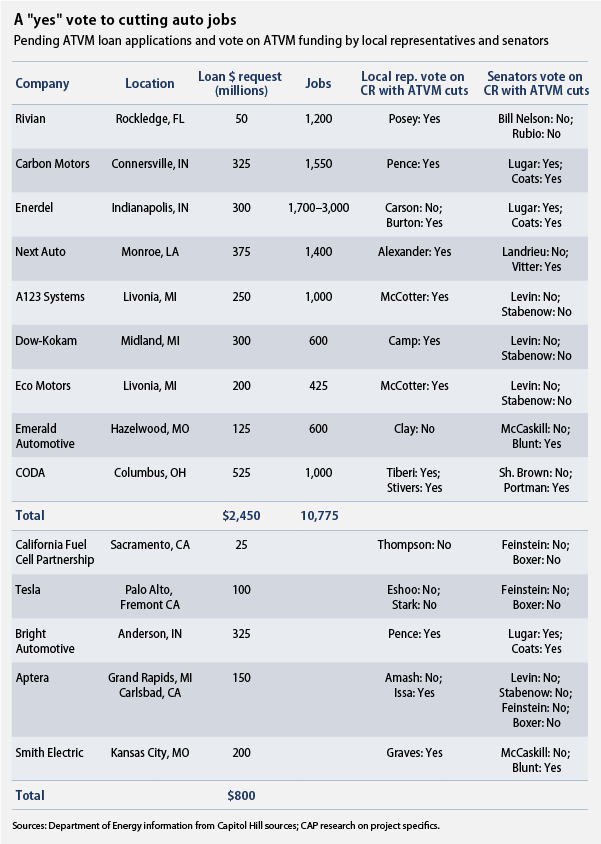The House Republicans’ assault on jobs continued last week, tucked into a bill to keep the government running after September 30. Early Friday morning the House passed a continuing resolution to fund the federal government through November 18 by a vote of 219-203. This bill includes $3.65 billion for emergency disaster relief but pays for it by cutting $1.5 billion for the Advanced Technology Vehicle Manufacturing loan program that helps domestic auto plants retool to manufacture the clean cars of the future. This offset—helping extreme weather victims by slashing auto jobs—was voted against by nearly all House Democrats and two dozen House Republicans.
The Senate immediately rejected this approach to disaster assistance by voting later that day to table the House bill by a 59-36 vote. Senate Democrats support replenishing the nearly barren disaster relief cupboards but they oppose cutting the clean car jobs program to do it. The Senate could vote as early as Monday evening on funding the government and paying for disaster relief without disinvesting in clean car manufacturing and jobs.
Last week the Center for American Progress noted that there are 18 pending ATVM loan applications in various stages of the approval process with a total request for $9.8 billion in loans. We identified these pending applications by state, loan request, and the type of project but we did not have more details about these proposals.
Since then we were able to tentatively identify 13 of the companies and their locations. For nine of the projects we were able to determine the estimated number of jobs they would generate. These nine projects requested $2.5 billion in loans and would create at least 10,000 jobs.
The nine projects are located in places represented by eight Republicans and two Democrats in the House. All eight Republicans voted for the continuing resolution to slash funds for these loans and auto jobs while both Democrats voted against cutting the loans.
There are six senators from each party that represent the states with these nine projects. All but one of the Republicans voted to cut funding for their home state projects while all the Democrats voted to retain the ATVM loan funds.

If enacted, the cut in loan funds makes it extremely unlikely that the Department of Energy will have the funds to approve all 18 pending applications. So, for example, a proposal for an advanced battery project in House Speaker John Boehner’s home state of Ohio by CODA, an automotive company, may not receive funds. CODA applied for a $525 million loan for a plant in Columbus that would employ 1,000 workers. The Columbus Dispatch noted that “the $1.5 billion cut would make it less likely that CODA would be awarded a loan.”
Sam Spofforth, executive director of Clean Fuels Ohio, a nonprofit group based at Ohio State University, lamented that “it would be a pretty big blow.”
Some senators and representatives who voted to slash funds for ATVM loans previously urged the Department of Energy to speed up its approval process. For instance, on June 13, 2011, Indiana Sen. Richard Lugar and Reps. Dan Burton, Mike Pence, Marlin Stutzman, Larry Bucshon, Todd Rokita, and Todd Young wrote Energy Secretary Steven Chu seeking his “assistance in expediting the final approval process” for a $325 million loan to Carbon Motors in Connersville, Indiana, that would create 1,550 jobs. Yet they all voted to cut ATVM loan funds, which increases the likelihood that DOE won’t have the money for this loan.
Rep. Darrell Issa (R-CA) wrote to Secretary Chu on January 14, 2009 (before Chu was sworn in) to:
… express my support for Aptera Motor’s application for a loan [under ATVM]. … funding will allow Aptera to establish U.S. manufacturing facilities for the commercial production of its plug-in and hybrid electric cars.
Aptera’s project will also promote domestic job creation throughout California as well as in other states.
Rep. Issa voted to slice ATVM funding by voting for the continuing resolution last week.
At a time of high unemployment, these loans to fund clean auto jobs are more important than ever. The first set of ATVM loans issued by DOE created 40,000 jobs. This week the Senate will determine whether it is willing to help disaster victims recover from extreme weather while still investing in domestic manufacturing jobs to build clean cars that produce significantly less carbon dioxide pollution linked to extreme weather.
Daniel J. Weiss is a Senior Fellow and Director of Climate Strategy and James Barba Nazar is an intern at American Progress.
Sources for CAP research on specific projects:
Dow-Kokam:
http://www.dow.com/financial/pdfs/newsletters/Dow_Newsletter_2_7.pdf
http://www.dow.com/michigan/kokam/index.htm
http://www.dow.com/news/corporate/2009/20090805b.htm
Enerdel:
http://www.doe.gov/articles/enerdel-expanding-battery-manufacturing-indiana
A123:
http://energy.gov/articles/a123-systems-moves-lab-assembly-line
http://www.doe.gov/articles/secretary-chu-visits-advanced-battery-plant-michigan-announces-new-army-partnership
GM Does Deal With A123 – Will Launch 1st Pure Battery-Electric Vehicle in 2014
Aptera:
http://www.greencarcongress.com/2009/09/wsj-aptera-20090915.html
Johnson Controls:
http://energy.gov/articles/how-advanced-batteries-are-energizing-economy
http://energy.gov/articles/powering-recovery-michigan
LG Chem:
http://www.mlive.com/business/west-michigan/index.ssf/2011/09/construction_complete_at_lg_ch.html
http://gigaom.com/cleantech/lg-chem-to-build-303m-volt-battery-plant-in-holland-mich/
Carbon Motors:
http://www.pal-item.com/article/20110922/NEWS01/109220326/Disaster-relief-spending-could-put-Carbon-Motors-loan-request-risk
http://www.theindychannel.com/news/29273048/detail.html
See also: